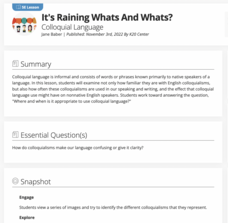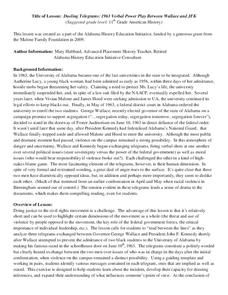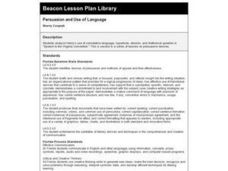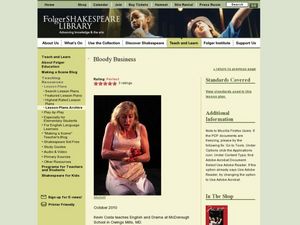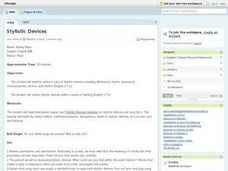EngageNY
Grade 9 ELA Module 1, Unit 1, Lesson 1
Word choice can drastically alter the tone of a piece of writing. Ninth graders read Karen Russell's short story "St. Lucy's Home for Girls Raised by Wolves" and use textual evidence to help them analyze how word choice affects their...
Teaching Tolerance
Using Photographs to Teach Social Justice | Exposing Gender Bias
Young sociologists are asked to read two photographs, identifying how the photographer uses point of view, color, pose, light, and shadow to express a stereotype of women or to challenge those stereotypes. Partners then create their own...
Newseum
Weed Out Propaganda
Young scholars study four essential propaganda techniques: Simplification, Exploitation, Exaggeration, and Division (S.E.E.D.). Individuals select an example of propaganda from the past and present then compare how the key elements have...
Newseum
Disinformation Nation: Is It Propaganda?
Propaganda or not? That is the question researchers must answer as they analyze techniques used in ads. Pupils use a three-part definition to determine if the ad is propaganda or advertising.
Newseum
Disinformation Nation: Checking Your Emotions
Propaganda is designed to manipulate! High schoolers learn how to recognize the devices propagandists use to evoke strong emotional reactions and practice techniques that help them avoid being manipulated.
Newseum
Disinformation Nation: Separating Politics and Propaganda
Separating political rhetoric from propaganda is no small feat. Class members are challenged to examine two different sources about a candidate in an upcoming election and determine whether the primary purpose of the source is to inform...
National Endowment for the Humanities
Dostoevsky's Crime and Punishment
Pain and suffering do not have to be inevitable in a study of Crime and Punishment. A carefully scaffolded lesson plan introduces readers to the divided natures of the characters in Fyodor Dostoevsky's complex novel. Groups use the...
Overcoming Obstacles
Listening Critically
Eschew obfuscation!! High schoolers learn techniques that permit them to listen critically, sort through verbiage used to hide meaning or mislead listeners, and determine the message's validity.
Curated OER
An Ideal for Which I Am Prepared to Die
English language learners have an opportunity to closely examine the academic language in portions of Nelson Mandela's famous 1964 Court Speech, "An Ideal for Which I Am Prepared to Die," with a lesson plan that looks at key passages...
K20 LEARN
It’s Raining Whats and Whats? Colloquial Language
"Yuns betta outten the lights!" Colloquial language is the focus of a lesson that asks middle schoolers to consider the pros and cons of using idioms. They read articles, match expressions with their meaning and place of origin, and...
K20 LEARN
Is Pizza Epic? Word Choice
Remember when everything was Fantastic! Fabulous! Awesome! Iconic! A series of activities encourages young writers to move beyond these overused descriptors and instead choose a more precise language.
Alabama Department of Archives and History
Dueling Telegrams: 1963 Verbal Power Play Between Wallace and JFK
Information, inferences, and innuendos. Text and subtext. Class members examine telegrams exchanged between President John F. Kennedy and Alabama Governor George Wallace, studying both what is stated and what is implied by the diction...
Novelinks
The Heart Is a Lonely Hunter: Vocabulary List
A staggering amount of work went into compiling this vocabulary resource for Carson McCullers' The Heart Is a Lonely Hunter. The overview provides a rationale for the strategy and information about tier 1, 2, and 3 words. The 19-page...
Curated OER
What Do You Call Older People?
Students brainstorm a list of words they use to refer to the elderly. As a class, they discuss the importance of word connotations and explain those used to refer to the older population. They complete a handout and share their thoughts...
Curated OER
Persuasion and Use of Language
Students discuss connotative language, hyperbole, allusion, and rhetorical question. In small groups, they read one section of the "Speech to the Virginia Convention" and analyze these devices. Groups present their results to the class.
Curated OER
Poetry Analysis Device: TPCASTT
Learners analyze the key elements of poetry using a mnemonic device. The device: TPCASTT (title, paraphrase, connotation, attitude, shifts, title and theme).
Curated OER
Bloody Business
Students research word frequencies in Macbeth and create a frozen picture inspired by a word. In this Macbeth lesson, students view Blood Will Have Blood and discuss the dual meaning of the word "blood." Students identify five major...
Curated OER
IPM Basics
Fourth graders recognize that the term "pest" has a social connotation. They distinguish between good pest management practices and poor pest management practice and demonstrate knowledge of the IPM pyramid.
Curated OER
Reading Comprehension
Students examine the title of a book and make assumptions of what words might appear inside. Then the students split the words into categories according to their connotation and compose their own stories based on the title of the book.
Curated OER
Stylistic Devices
Young scholars review connotation and denotation and stylistic devices in poetry. They read the lyrics to a song as it is being played and then discuss the meaning of the song. As a class, students read poems, share their thoughts, and...
Curated OER
1704 Attack on Deerfield
Class groups examine conflicting primary and secondary sources describing the 1704 attack on the fort at Deerfield by French and Native Americans and analyze the implications of discrepancies.
Scholastic
Choose Your Words Wisely (Grades 9-12)
Words, words, words. The function of words in persuasive writing is the focus of a group activity that asks members to analyze how words advertisers use are designed to influence targeted audiences.
Macmillan Education
Communication
Especially tricky for language is understanding the line between inappropriate, confrontational, (in)effective, (un)reasonable and diplomatic English. The activities in the resource permit class members to practice communicating using...
EngageNY
Forming a Research-Based Claim: Cascading Consequences Charts
Life is all about choices and consequences. Using a Cascading Consequences chart, scholars create a visual map of the effects of a particular choice or action related to water management. With their researcher's notebooks and copies of...
Other popular searches
- Connotation and Denotation
- Connotation Worksheets
- Connotation Words
- Connotation Denotation
- Connotation vs. Denotation
- Poetry Connotation
- Connotation vs Denotation
- Word Connotations
- Connotations and Denotations
- Connotation, Denotation
- Connotations of Words
- Denotation and Connotations











